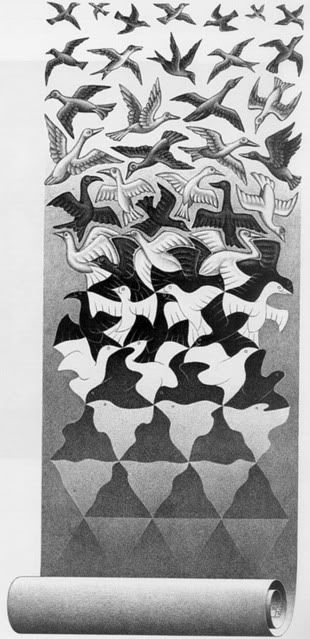
MC Escher, "Liberation" (1955)
The Enlightenment, which was to deliver us from our tutelage and minority, operated on the principle that traditions and social stratifications that had been taken for natural were in fact unfounded human conventions. Having denaturalized that old feudal order the liberal revolution of freedom, equality and universal fraternity could be brought about. Yet, this political emancipation, as Marx called it, only affected persons at the most formal level, while leaving the very real divisions of civil life intact. Thus, it is no surprise in the face of the ubiquity of Late Capitalism that once again society is confronted with large scale social stratification that is effectively feudal-aristocratic insofar as one’s economic possibilities are largely a function of one’s ‘accident of birth’. At the same time, humanity is inundated with the frantic insistence on the naturalness of the liberal tradition itself, the universal desire for democracy and of course the natural rationality and freedom of capitalism.
It is no wonder, then, that among those who do not wish to enlist in the Crusade for democratic-capitalism, a position which has ironically taken on the role of a conservative ideology (Fukayama), there is a tendency to call for a renewal or completion of the Enlightenment (Habermas): in other words, a repetition of the strategy to denaturalize and revolutionize for the sake of freedom in order to overturn the lingering sources of stratification, division and alienation. Yet this is the very program of abstraction and formalization which brought about the current order.
Others, like John Milbank, suggest that the Enlightenment be abandoned in favor of a hierarchical but non-alienated society, one that can embody hierarchical difference without violence. While such a position does grasp the essential role hierarchy plays in current societal organization, and its ties to any attempt to discern the Good in the present moment, it ignores that the hierarchies themselves feed off alienation and violence in order to fulfill their educative function. As Milbank’s own mentor, Augustine, would have taught him, Cogito (knowledge) cannot loose itself from Cogo (power); hierarchies only ever exist because of sin.
Finally, then, ought one not see the possibilities of politics as present within the contradictions and alienations of political liberalism? This would mean not looking for some new solution, which would be nothing but the raising up of some new idol, one which would be judged by capitalism in any case. Instead by insisting on non-closure and relativity of this historical moment and the persistence of the desire for something other than what is, one is open to the New which is our salvation. Only in this way can politics legitimately be the work of the people (liturgy).
1 comment:
dear friend,
some clumsy remarks:
=any 'Enlightment', as a conceptual structure claiming truth, is nothing but a new violence
=any 'Enlightment' implies a circle of 'enlightening' people; that is an elite; that is violence
=any 'Elightment' implies a denunciation of history as darkness; that is makes violence boundless
=the 'New' (whether it is possible to be any New in the nature of politics) as salvation cannot be but a new violence, as long as there is nothing new in collectivities (only in personal realm we can see something new) but new distributions of power
=all this fuss about world's and society's progress among western intelectuals is not but a sheer manifestation of their (western) empire-mentality? and if so, a sheer manifastation of political-conceptual violence?
thanks for your patience
Post a Comment